New Horizon Colledge English unit 1
新视野大学英语第一册1ppt
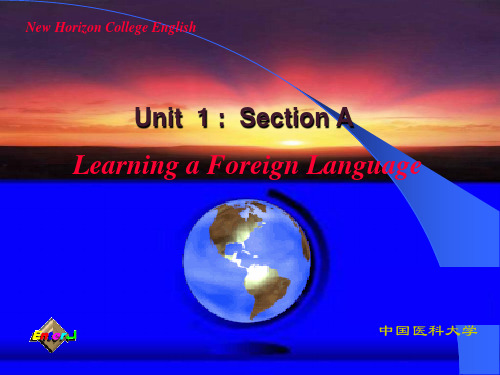
7. opportunity
a good chance; a favorable moment
e.g. With the help of his teacher, he got an opportunity to learn English in England.
8. communicate communication 9. medium media
1. reward & award
award: award sb. sth.
e.g. The judges awarded them equal points.
2. frustrate
frustrating: a. discouraging; disappointing
e.g. It’s frustrating to have all these great plans and no money for achieving them.
14. insight
n. the act of seeing or understanding something very clearly
e.g. The teacher had unusual insight into children’s emotions.
III. Expressions & Patterns
II. Text Study
1. How the author feels about his foreign language learning? 2. The author’s foreign language learning experiences in four stages: 1) in junior middle school 2) in senior school 3) in college 4) through online English study
新视野大学英语第四册unit 1new
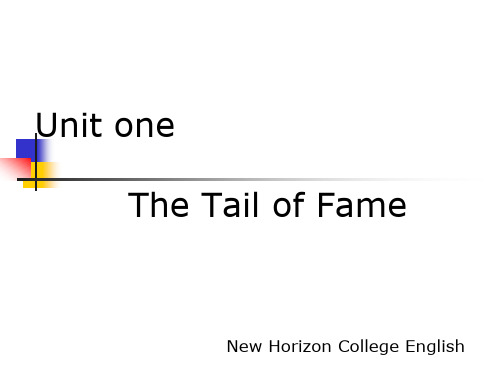
4. T.S.艾略特(1888-1965,美国诗人、
剧作家,获1948年诺贝尔文学奖)
T.S. Eliot (1888—1965) was a poet, playwright, and critic. Born in St. Louis, after Harvard he studied in Europe, in 1927 becoming a British citizen. He won the 1948 Nobel Prize for Literature.
Tennessee Williams (1911—1983) was an American writer whose plays are mainly about people with emotional problems and are set in the Southern States. As a playwright Williams began his career while studying at the University of Missouri and Washington University, St. Louis.
2.欧内斯特·海明威(1899-1961,
美国作家,获1954年诺贝尔文学奖)
Ernest Hemingway (1899—1961) was one of the most famous American novelists, short story writers and essayists, whose deceptively simple prose style散文 风格 has influenced a wide range of writers. Hemingway was awarded the 1954 Nobel Prize for Literature.
新视野大学英语视听说教程(第二版)第二册 UNIT 1
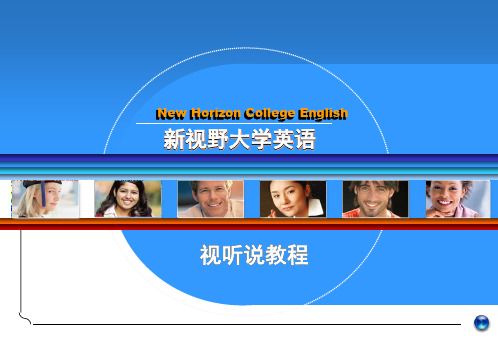
Book 2 – Unit 1
Viewing, Listening & Speaking
Listening and Discussing
Listen to some musical works and finish the tasks that follow.
Task 1. Lyrics Blank Filling
Book 2 – Unit 1
Viewing, Listening & Speaking
Lead-in
Questions for groups 1 and 2:
1. Which do you prefer, pure music or songs? Why? 2. If you prefer songs, which singers, groups or bands do you like best? If pure music, which musicians do you favor most?
Book 2 – Unit 1
Viewing, Listening & Speaking
Lead-in Questions for groups 3 and 4:
1. Do you sing songs or play any musical instrument? How did you begin, improve and master it? What are the benefits of taking to music? 2. Do you believe music can affect people’s mood and state of mind? Give an example of specific music producing specific effects on you.
《新视野大学英语》课件第一单元
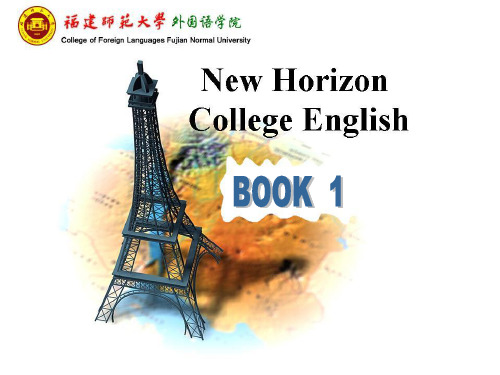
Chinese
Para 4 However, that state didn’t last long. When I went to college, I learned that all students were required to take an English course. Unlike my senior middle school teacher, my college English teachers were patient and kind, and none of them carried long, pointed sticks! However, the situation was far from perfect. As our classes were very large, I was only able to answer a couple of questions in each class period. Also, after a few weeks of classes, I noticed there were many students who spoke much better than I did. I began to feel intimidated. So, once again, although for different reasons, I was afraid to speak. It seemed my English was going to stay at the same level forever.
Chinese
Para 5 That was the situation until a couple of years later, when I was offered an opportunity to study English through an online course. The communication medium was a computer, phone line, and modem. I soon got access to the necessary equipment, learned the technology from a friend and participated in the virtual classroom 5 to 7 days a week. Para 6 Online learning is not easier than regular classroom study; it requires much time, commitment and discipline to keep up with the flow of the course. I worked hard to meet the minimum standards set by the course and to complete assignments on time.
《新视野大学英语读写教程》(第二册)Unit 1 Time-Conscious Americans
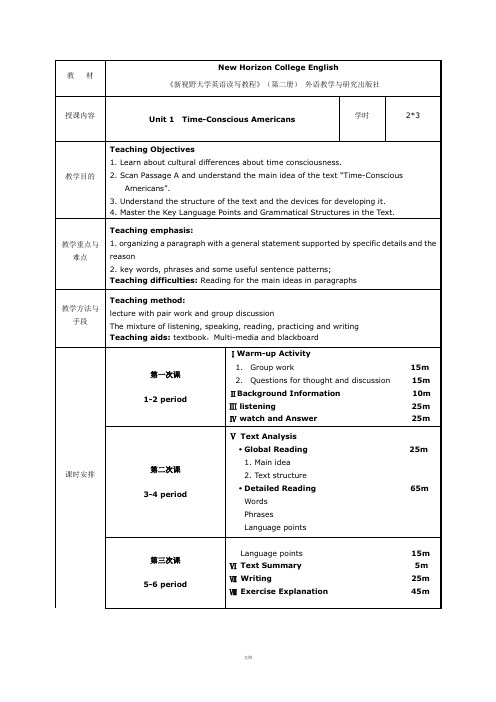
Ⅴ Text Analysis ·Global Reading 1. Main idea 2. Text structure ·Detailed Reading Words Phrases Language points
15m 15m 10m 25m 25m
25m
65m
第三次课 5-6 period
ⅣListen and Answer (提问 视频)
Directions: Listen to a passage about people’s attitude toward time in the US and answer the following questions according to what you hear. 1. What does time mean to us? 2. What should we do with time?
3-4 Period
文档
Americans”. 3. Understand the structure of the text and the devices for developing it. 4. Master the Key Language Points and Grammatical Structures in the Text.
Ⅱ Background Information: (讲解 课件)
1. Cultural Conflicts: Each nation has its own conventions. Different nations have different cultures. When two cultures clash, problems in communication may occur. Which side should compromise when there are cultural conflicts? In fact, knowing and understanding the other's culture is the responsibility of both sides, and both sides should be willing to compromise. Educating, rather than complaining and blaming, is the best solution to cultural conflicts.
新视野大学英语第二版第一册unit1
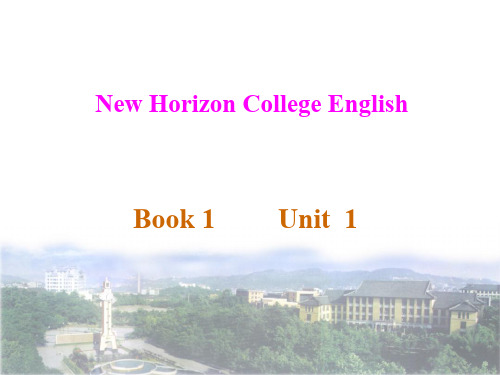
Listen to the text:
2. Junior middle school
Junior middle school refers to the stage in the Chinese education system which follows primary school and includes years six through nine in the school time sequence. Normally, students are 12 or 13 years of age when they begin the sixth or transition year of junior middle school. In the American system, junior middle school most closely approximates middle school or junior high school in which the beginning or ending years of this period may vary slightly from region to region. The beginning age is about the same as that of junior middle school students in China.
不同年级大学生的名称:
freshman大一新生 sophomore大二学生 junior大三年级学生 senior大学四年级学生
2. While-reading Activity
1). New Words and Phrases
1. Reward –联系记忆:rewarding 形 容词 值得的,有奖励的
新视野大学英语教材一课文
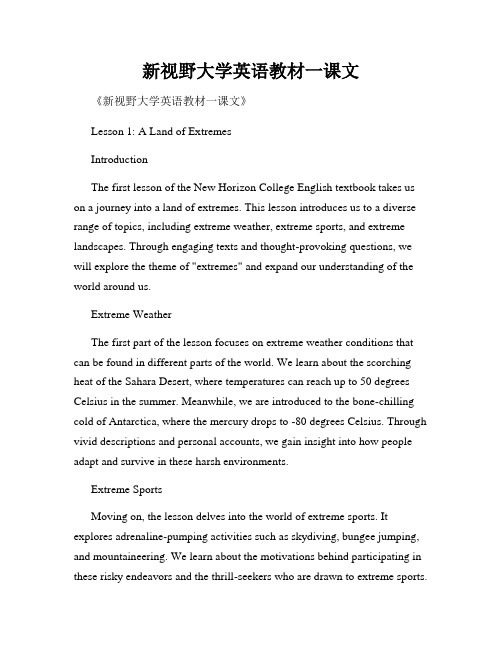
新视野大学英语教材一课文《新视野大学英语教材一课文》Lesson 1: A Land of ExtremesIntroductionThe first lesson of the New Horizon College English textbook takes us on a journey into a land of extremes. This lesson introduces us to a diverse range of topics, including extreme weather, extreme sports, and extreme landscapes. Through engaging texts and thought-provoking questions, we will explore the theme of "extremes" and expand our understanding of the world around us.Extreme WeatherThe first part of the lesson focuses on extreme weather conditions that can be found in different parts of the world. We learn about the scorching heat of the Sahara Desert, where temperatures can reach up to 50 degrees Celsius in the summer. Meanwhile, we are introduced to the bone-chilling cold of Antarctica, where the mercury drops to -80 degrees Celsius. Through vivid descriptions and personal accounts, we gain insight into how people adapt and survive in these harsh environments.Extreme SportsMoving on, the lesson delves into the world of extreme sports. It explores adrenaline-pumping activities such as skydiving, bungee jumping, and mountaineering. We learn about the motivations behind participating in these risky endeavors and the thrill-seekers who are drawn to extreme sports.Through interviews and narratives, we gain a glimpse into the mindset and experiences of individuals who push the boundaries of physical and mental limits.Extreme LandscapesThe final part of the lesson takes us on a visual tour of extreme landscapes found across the globe. From the awe-inspiring Grand Canyon in the United States to the spectacular Victoria Falls in Africa, we are presented with breathtaking images and fascinating facts about these natural wonders. By exploring these extreme landscapes, we gain a deeper appreciation for the beauty and diversity of our planet.ConclusionIn conclusion, the first lesson of the New Horizon College English textbook provides us with an introduction to the theme of "extremes." Through the exploration of extreme weather, extreme sports, and extreme landscapes, we are exposed to various aspects of the world that challenge our perceptions and expand our horizons. By immersing ourselves in these texts and reflecting on the accompanying questions, we are encouraged to think critically and form our own perspectives. This lesson sets the stage for our journey through the English language and opens our eyes to the vastness and complexity of the world we live in.Word Count: 363 (excluding title and introduction)。
New_Horizon_College_English_4_unit_1

Don’t worry. I’ll help you solve the biggest problem.
I’ll help you with the main problem. I can help you sort out the major difficulty. Look, relax. I’ll help you with those courses.
Let’s see how William deals with his anger.
sadness
Blue down in the dumps feel low/depresse
你看上去很忧郁。 You look blue. 那天我的心情跌入谷底,因为我男朋友说我的 头发一团糟。 I was feeling very down in the dumps one day because my boyfriend said my hair looked a mess . 每当我心情不好我就去看电影。 Whenever I feel low I go to a movie.
I think little of (fast food).
3. Promising and refusing to help
I’ve come to cheer you up. I’m here to brighten your life. I’ll help you let some sunshine into your life. It’s not going to work.
What make you angry? Mention at least 3 reasons people get angry. Look at the video. Why is William mad at Emily?
- 1、下载文档前请自行甄别文档内容的完整性,平台不提供额外的编辑、内容补充、找答案等附加服务。
- 2、"仅部分预览"的文档,不可在线预览部分如存在完整性等问题,可反馈申请退款(可完整预览的文档不适用该条件!)。
- 3、如文档侵犯您的权益,请联系客服反馈,我们会尽快为您处理(人工客服工作时间:9:00-18:30)。
1
1
Text Study—Understanding
At college (Para.4):
patient and kind, no pointed The teacher: _____________________________ sticks _____________________________ very large, many students spoke The classes: _____________________________ much better than I did _____________________________
Related Information
1. What do these online abbreviations (缩写) mean?
•f2f • 4u • 2u • Ilu • ur • pls • bb • EOM • face to face • for you • to you • I love you. • your • please • Bye bye. • End of Message
1
1
Warming-up
I. Your Experience of Learning English
1. When and where did you begin to learn English? 2. Do you enjoy learning English? Why? 3. How was your English teacher in junior or senior middle school? 4. Do you have any trouble learning English? If any, what is it? ... Tips
1
1
Text Study—Understanding
In senior middle school (Para.3): punishing quickly, pointing a long The teacher: _____________________________ stick at us and shaking it up and _____________________________ down, shouting “No! No! No!” _____________________________ The author: _____________________________ losing my eagerness, losing my joy, losing my desire _____________________________
The author: _____________________________ feeling intimidated, afraid to speak, staying at the same level _____________________________
1
1
Text Study—Understanding
1
1
Warming-up
3. How was your English teacher in junior or senior middle school?
Tips — My English teacher in... was
kind/patient/encouraging/strict/impatient/ cold/always angry.
1
1
Warming-up
4. Do you have any trouble learning English?
Tips
— I always feel it difficult to... — It’s not easy for me to… • • • • • understand what others say. remember so many words. understand the grammar. read quickly. speak in public.
1
1
Warming-up
1. When and where did you begin to learn English?
Tips
— I began to learn English... years ago. — I have learned English for...
— My experience with English began in... when...
1
1
Text Study—Understanding
I. Understanding
The author presents readers with his own language learning experiences at different stages. And at different stages, the author met different teachers and consequently formed different attitudes towards English learning. Now find the information to fill in the blanks.
1
1
Related Information
• ASAP • BF • CU • GF • IC • OIC • RSVP • TY
• as soon as possible • boyfriend • see you • girlfriend • I see. • Oh, I see! • Reply please
1
1
1
Text Study—Understanding
In junior middle school (Para.2):
kind and patient, positive, The teacher: _____________________________ often praising the students _____________________________ at the top of my class, eagerly The author: _____________________________ answering all the questions, never _____________________________ worrying much about making mistakes
1
1
Related Information
the World Wide Web log on to the Internet web browser pull-down menu search engine dial-up connection main page CD=compact disk
万维网(WWW) 登录上网 网络浏览器 下拉菜单 搜索引擎 拨号上网 主页 光盘
1
1
Warming-up
2. Do you enjoy learning English? Why?
Tips
— No, I don’t enjoy it because it is useless / too difficult. — Yes, I enjoy it very much. It can help me • find a good job after graduation. • learn the cultures of other countries. • make some foreign friends. • learn the value of hard work.
1
1
Text Study—Understanding
The benefits of learning a foreign language (Para.8): 1. Teaching ____________________________ me the value of hard work.
The on-line learning (Paras.5—7): The on-line learning requires: ________________________________ much time, commitment, discipline The author (at the beginning): making many mistakes, crying out of ________________________________ frustration, feeling like giving up ________________________________ The author (finally): reaping the benefits of all the ________________________________ hard work ________________________________
1
1
Warming-up
Tips for advantages
• • • • • • • equal opportunity to do... any place, any time or pace cheaper and more convenient quicker and easier to get access to much information student-centered no limit to the number of students ...
1
1ic of Each Part
Para. Topic
